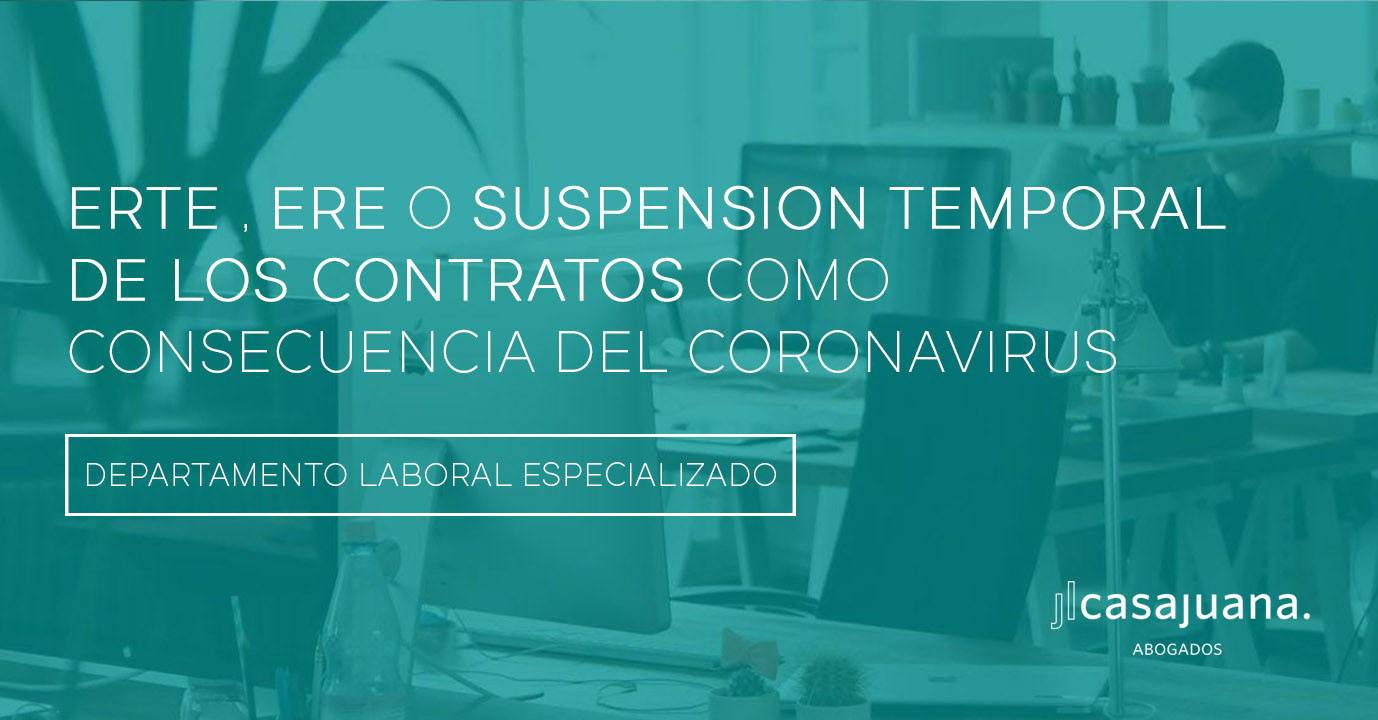Company and ERTE due to force majeure

Given the undoubted health crisis we are facing, the Royal Decree-Law 8/2020 published on March 17, 2020 approved by the Council of Ministers refers to urgent and extraordinary measures to deal with Covid-19, in addition to the < a href="https://www.boe.es/buscar/act.php?id=BOE-A-2020-4152" target="_blank" rel="nofollow noopener noreferrer">Royal Decree 9/2020 of March 27, 2020, by which complementary measures are adopted, in the workplace, to alleviate the effects derived from COVID-19.
These include the measures that will affect workers in the face of Covid-19, among them we highlight the preferential nature of teleworking, which will be the first option, provided that the activity in question can develop in those conditions. If necessary, workers will have the right to adapt their working hours, to favor family reconciliation, since educational centers, as we well know, are closed.
In RDL 8/2020 and 9/2020, the figure of the ERTE that everyone talks about is included as a measure to avoid layoffs, but that already existed and was It is regulated in article 47 of the Workers’ Statute, as a mechanism to overcome negative situations in a company, allowing the employer to adopt a series of temporary measures that we will analyze below.

What is an ERTE and how to accredit it (force majeure and/or productive, economic or technological causes)?
First of all, it must be clarified that an ERTE is a Temporary Employment Regulation File, which is regulated in article 47 of the Workers’ Statute . Said file allows the employer, through the reduction of the working day or the suspension of the employment contract, to adjust the working day of one, several or all the employees to the needs of the company, by means of the interruption of a part or all of the provision of services. In addition to this, the employer is exonerated from the payment of salaries corresponding to the days of work not carried out. In this way, the employer will be able to readjust the volume of work, with the aim of responding to the negative, unexpected and temporary business situation, which, in this case, would be the Covid-19 crisis.
For the application of article 47 ET it is necessary to comply with the procedure established in article 51 ET, which implies administrative control, since that the labor authority will be in charge of authorizing the employment regulation file, which must have been submitted to negotiation between the company and the workers’ representatives.
When requesting the application of an ERTE, the employer must comply with a series of legal requirements, that is, that there are certain conditions in the law, such as: economic, technical, organizational or production causes or causes derived from force majeure.
On the one hand, it will be understood that economic causes concur when there is a negative economic situation, which can be verified with the results of the company, as could be the existence of current or expected losses or the gradual decrease in the level of income. As long as the decrease in income covers the period of two consecutive quarters of the income level, the decrease will be considered to be persistent.
On the other hand, we will understand that technical causes occur when changes occur in the field of means or instruments of production. When speaking of organizational causes changes occur in the field of systems and work methods of the staff or in the way in which the production system is organized. While the causes of production occur when there are changes in the products or services that the company intends to introduce in a given market.
No obstante, todas estas causas quedarán en manos de la Autoridad Laboral, para determinar si comprenden de la gravedad suficiente para proceder o no la aplicación del ERTE.
However, all these causes will remain in the hands of the Labor Authority, to determine if they are serious enough to proceed or not with the application of the ERTE.
We also mentioned as a cause of ERTE, cases due to force majeure, which will be those derived from external events and unrelated to the company, provided they are considered unforeseeable or unavoidable, as well as natural disasters, or health crises, such as the one we are currently facing due to the Covid-19 pandemic.
Article 3 of RDL 9/2020 modifies the content of article 25 of RDL 8/2020, which establishes the necessary mechanisms to expedite the processing and payment of benefits derived of an ERTE due to force majeure.
Therefore, for the start of the file, the collective application submitted by the employer to the managing entity of unemployment benefits is required. Said request must be accompanied by the necessary information, segmented by each affected work center and specifying the measures that are intended to be adopted for them. In the same way, the employer will be summoned to communicate any variation that may arise in the original data of the application. The SEPE has just approved a form to carry out this request.
The application will be submitted through the electronic channels provided for this purpose, and the Public State Employment Service (SEPE) will reply within 5 days.
When the company communicates the ERTE, it suspends the obligation of the employer to deal with the provision of services by the employee, that is, the employer will not have to pay wages from the workers. Therefore, the worker will stop collecting the payroll, in order to collect the total unemployment benefit (in cases of suspension) or partial (in cases of reduced working hours).
Different measures that can be adopted with an ERTE: reduction of working hours or/and suspension of contracts
We are faced with two modalities when carrying out an ERTE, it can be done by reducing the working day and or suspending employment contracts.
The reduction of working hours file, regulated in article 47.2 of the ET, implies for those affected workers the reduction of their working hours for a period of time determined, either by reducing the hours of the daily working day, or by reducing the number of days worked per week.
In this case, the affected workers will collect the hours worked through the payroll, and proportionally, the hours not worked corresponding to the reduced working day, will be charged through of the unemployment benefit.
The suspension file, will suspend the employment contracts of the affected workers for a certain period of time. It should be remembered that, even if the worker does not go to his job and the employer does not pay his salary, we are not facing a dismissal, since once the situation that motivates the ERTE ends, the employee will rejoin with the same conditions to your job.
Conditions and duration of an ERTE
During an ERTE, workers will be affected by the following conditions:
First of all, as we have already seen, when workers are affected by an ERTE due to force majeure, workers may collect the unemployment benefit provided that SEPE authorizes it, the amount corresponding to the number of hours they stop working, in the case of a reduction in working hours, or for the total number of hours, in the case of contract suspension, without counting as consumed months of unemployment. This is a novelty that improves the conditions of those affected, in the event, which might not be improbable, that this temporary measure of employment regulation would be followed by a definitive one.
Secondly, regardless of the cause behind the ERTE, all workers who meet the legally established requirements to receive unemployment benefit will have the right to receive it (of Exceptionally, the minimum grace period of the previous contribution period will not be required at this time to access the benefit).
Thirdly, any ERTE must be applied during an established period of time, although said period may be extended later. Once the ERTE has ended, the worker will have the right to return to work with the conditions he previously had. A guarantee has even been established in relation to these ERTEs, clearer in cases of force majeure, of the obligation to maintain employment for a duration of six months at the end of the ERTE
Fourth, since an ERTE is not a dismissal, the worker will not be entitled to receive any compensation from the company. Another thing is that through the negotiation, or by unilateral decision of the employer, the person affected by the measure sees the unemployment benefit improved by the employer up to a certain level related to the salary not received.
Finally, the employer will continue to pay the full Social Security contribution of the worker affected by the ERTE, while it lasts.
ERTEs motivated by economic, technical, organizational or production reasons usually agree on a certain duration between the company and the workers’ representatives during the consultation period. In the case of not reaching any agreement, it will be the competent labor authority, which determines its duration.
However, when it comes to an ERTE motivated by force majeure, the consultation period in which the employer and the workers’ representatives come to an agreement is not mandatory. agreement, so it will be the employer, who determines the duration of this in the ERTE request, as long as it is approved by the labor authority.
As a conclusion, an ERTE does not have a certain duration limit, although it is possible that there is a duration determined beforehand. However, it is allowed to chain several ERTEs consecutively, as long as the legal requirements are met. That is why ERTEs due to force majeure, derived from the Coronavirus health crisis, are specified for the duration of the state of alarm and its possible extensions, although there is talk of the possibility of expanding the estimate of the existence of force majeure in certain cases and sectors (such as those related to tourism activity), at the end of the last extension that is approved of the state of alarm.
- Sanction and control
Applications submitted that falsify the data provided for the application of the ERTE will be controlled and penalized. Royal Decree Law 9/2020 warns that the request for ERTE by employers that contain falsehoods or inaccuracies in the data provided will be punishable, and in particular when there is no sufficient connection to the cause, which may generate undue benefits.
This situation will give rise to the ex officio review of the act of recognition of those undue benefits. In this case, and without prejudice to the corresponding administrative or criminal liability, the company must enter into the managing entity the amounts received by the worker, deducting them from the salaries not received that would have corresponded. RDL 9/2020 establishes that: “In the cases in which the managing entity appreciates signs of fraud to obtain unemployment benefits, it will notify the Labor and Social Security Inspectorate for the appropriate purposes”< /em>.
It may interest you:”ERTE, ERE OR TEMPORARY SUSPENSION OF CONTRACTS as a consequence of the Coronavirus”
Departamento Derecho Laboral J. L. Casajuana Abogados
23/03/2020



















